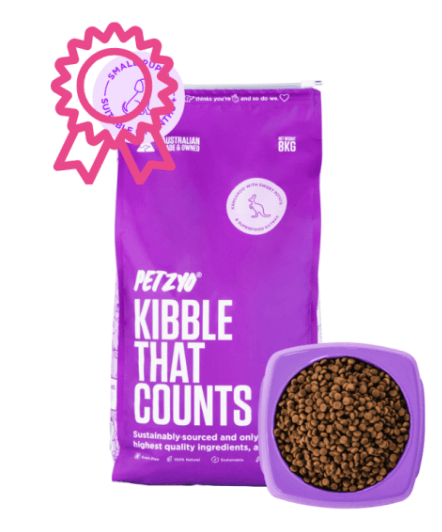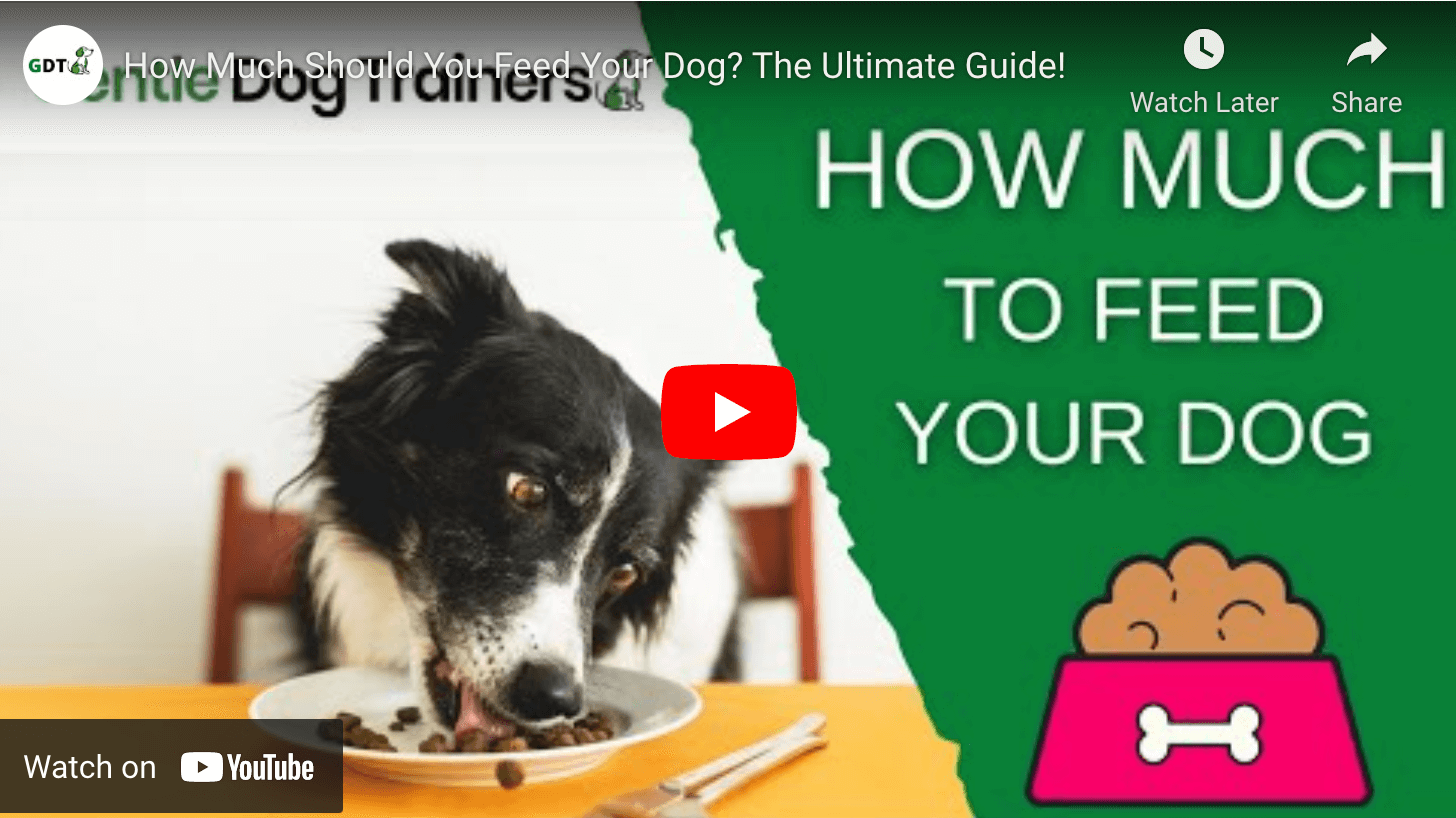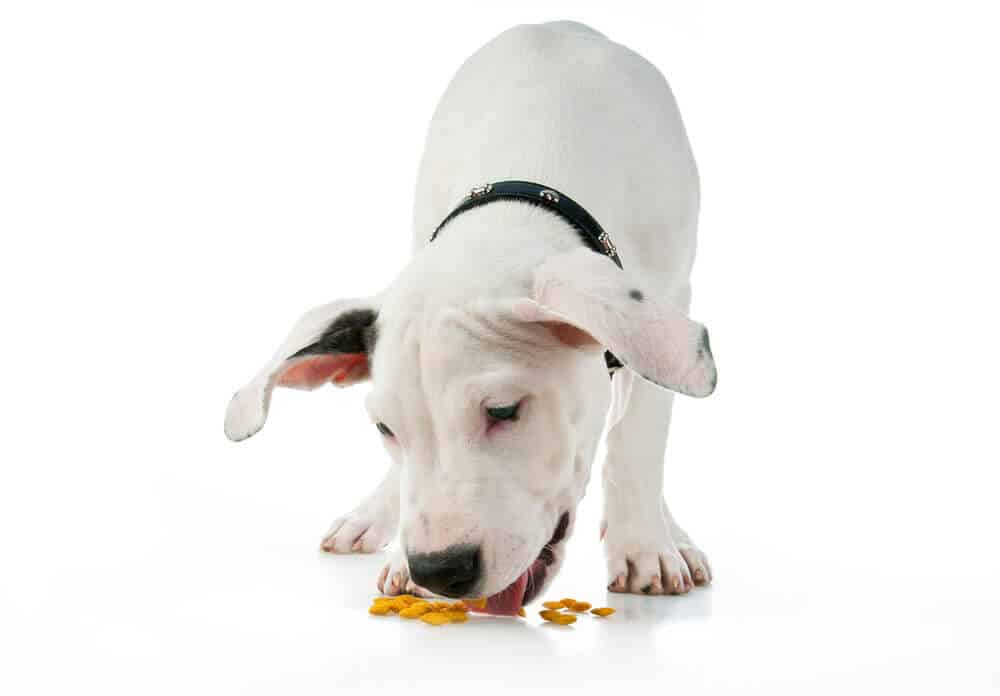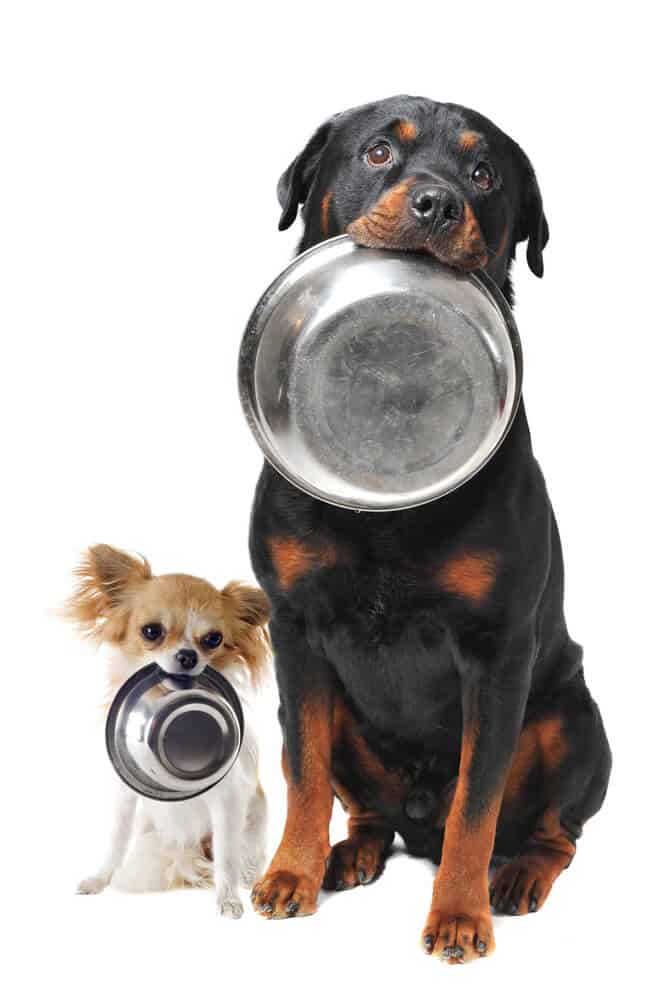How Much Yo Feed My Dog
How Much Food To Feed A Dog - A Puppy To Adult Canine Feeding Guide

Gentle Dog Trainers No.1 Dry Dog Food
PETZYO DOG FOOD
Many new dog owners wonder how much food to feed a dog.
Depending on their size, age and activity level, your pup will need more or less food per day. They may even need a different number of servings per day.
Your dog's feeding needs depend on many factors so it isn't possible to give a blanket answer that will work for everyone. But we can try!
Here are some simple guidelines you can follow on how much food to feed a dog every day to ensure your dog is getting enough food!
Check out our YouTube video on How Much Food To Feed Your Dog

How Much Should I Feed My Dog?
If you're wondering how much to feed a dog per day by weight, you're on the right track. While there isn't a one-size-fits-all answer, starting with their weight is usually your best bet.
In general, the amount you need to feed a dog is related both to their age and their ideal weight. In all cases, you should try to offer your pup the best dog food adapted to their needs. High-quality dog food has all the nutrients your furry friend needs to stay healthy and happy.
PRO TIP: Your dog should eat according to their size, weight, activity level, age and the type of food you're feeding them.
As a rule of thumb, dogs need about 1/3 cup of dry food per day for every 5 kilograms of weight. Keep in mind puppies may need 2x or even 3x as much, depending on the breed and age.
A good starting point is reading the label of your chosen food. Weigh your dog and follow the manufacturer's guidelines for a couple of days. If you see your dog leaves food in their bowl or seems hungry even after eating, adjust the quantities as needed.
How much should you feed a small dog?
Toy breeds and small dogs eat less food than their larger counterparts. If you have a Chihuahua, Shih Tzu or Pekingese, these are considered "toy" or "mini" breeds. Cavalier King Charles Spaniels, small Poodles, Boston Terriers and French Bulldogs are all "small" dogs.
Here are some general guidelines on how much food you should give your small dog [ 2 ]:
PRO TIP: Small and toy breed puppies are prone to hypoglycemia (low blood sugar levels). If left untreated, your puppy will show lethargy, weakness and even seizures. It's very important you offer your small breed puppy several small meals a day to keep their sugar stable. When in doubt, offer a small energy-dense treat like a piece of fruit. Bananas work well!
How much should you feed a large or giant dog?
Medium, large and giant dogs eat a lot of food. However, you should be careful to avoid overfeeding. Your pup will be much healthier if they stay at a healthy bodyweight. According to PetMD, here's how much you should feed your dog:
"Keep in mind your dog's calorie needs may vary as much as 25% more or less than the recommended amount" – Jennifer Coates, DVM [2]

How Often Should You Feed A Dog?
In general, veterinarians recommend that adult dogs eat 2 meals a day. Larger and giant breeds that are prone to bloat do better eating several smaller meals a day. In that case, a third meal might be the best option.
The amounts showed above are the total food and calories a dog should have per day.
You can break that in as many meals as you'd like or as advised by your vet.
Of course, keep in mind that puppies eat more frequently than adult dogs.
PRO TIP: To keep messes at bay, place a plastic dog feeding mat to catch crumbs and debris. Your floors will thank you!
Should Large & Small Breeds Eat The Same Food?
Not really!
Large and small breeds have different metabolisms and health needs. As such, high- quality dog food for their size offers proper nutrition adapted to those requirements.
Small breed dogs have a fast metabolism and need a diet that's slightly high in calories. On top of that, small dogs have significantly smaller jaws and their kibble should fit their mouths. Just imagine having to eat food the size of a brick, all in one bite! That's how a small dog feels when you offer "regular" kibble.
Large and small dog breeds have different metabolism and need specific food adapted to their energy needs.
On the other hand, large breed dogs tend to have joint issues and are more prone to bloating. As such, they need food with extra supplements (like glucosamine) and specific calcium levels. Large dog breed food is a little less energy dense than small breed dog food, to fit the slower metabolism of large and giant breeds.
PRO TIP: Large breed puppies need to grow slowly to avoid calcium deficiency and ensure their joints stay strong as adults. When in doubt, it's better to slightly underfeed a giant-breed puppy than offer too much food too soon. Talk to your veterinarian to adjust your puppy's feeding schedule as needed.

How Much Should I Feed My Puppy?
Puppies grow fast and their feeding needs change daily. If you have the time, weighing your puppy every day will offer a good starting point to calculate how much food to offer. However, most owners don't have the time or the proper scale to weigh their little ones.
When they're very young, puppies should drink their mother's milk freely. Once the mum starts weaning them, you can offer regular puppy food adapted to their adult size. Below you'll find how much to feed a puppy based on weight, as advised by veterinarians:
| Weight in Kg | Recommended Calories/Day |
|---|---|
| Daily calorie needs of small breed puppies (based on adult weight) | |
| 2.5 or less | 200 |
| 5 | 340 |
| 7 | 450 |
| 10 | 460 |
| Daily calorie needs of medium-sized puppies (based on adult weight) | |
| 15 | 750 |
| 20 | 1000 |
| 22 | 1100 |
| Daily calorie needs of large and giant puppies (based on adult weight) | |
| 30 | 1300 |
| 40 | 1750 |
| 50 | 2000 |
How Often Should You Feed A Puppy?
Wondering whether or not is it ok to feed a puppy twice a day? Here are some general guidelines:
If you have a mama dog with puppies, you can start offering free-grazing puppy food as early as three weeks old. If you feel your puppies are overeating, limit the free-grazing to a couple of hours twice a day.
However, once they are weaned, or if you get a puppy that's 2 months old or older, put food out at regular intervals. In general, four times a day is ideal.
PRO TIP: Stick to regular intervals when feeding puppies. If you're feeding 4x per day, offer food every 6 hours. That probably means you'll be feeding puppies late at night and early morning, but it will keep them properly fed and healthy.
When your puppy reaches 4 months old and is starting to teeth, they'll do great eating 3 times a day and should be eating the best puppy food available in Australia. Then, once they're 6 months old, you can switch them to an adult schedule and offer just 2 meals a day.
How Much Should I Feed A Dog With Specific Health Issues?
These recommendations are general guidelines aimed at healthy dogs. If your pup has other health issues like kidney or liver problems, obesity or gastritis, their meal schedule and food amounts may change.
"As long as the dog food is nutritionally complete and balanced and has the AAFCO [Association of American Feed Control Officials] guidelines on it, you'll be fine." – Marty Becker, veterinarian at North Idaho Animal Hospital. [3]
In such cases, your best option is consulting with a trusted veterinarian. They will evaluate your dog and recommend a feeding plan suited to their needs.
PRO TIP: If your dog has special health needs, ask your vet about choosing food tailored to their needs instead of regular food. Nowadays you can find specialty foods created to fit weight-loss plans, sensitive stomachs and even low-sodium diets.
Our Other Must Read Dog Nutrition Articles
FAQ
While small breed and large breed puppies can eat the same food, it's best if they don't. The difference between small and large dog food goes beyond the size of the kibble.
In fact, small breed dog food is more energy dense created to fuel their fast metabolism. On the other hand, large breed dogs have a slower metabolism and need food with a lower calorie count. If you don't offer the right food and amounts, your small puppy can be underfed or your large pup will grow too fast.
Offering your dog high-quality food adapted to their size and metabolism is the best way to ensure a healthy life further down the road.
No.
Puppies are growing, and because of that they usually need a calorie-dense diet. If you feed that same food to an adult dog, they will probably gain weight.
In addition, puppies also need more calcium than adult dogs. As such, puppy food has specific nutrients (like calcium and vitamin D) to support the growing body of a normal puppy. In contrast, an adult dog eating too much calcium won't absorb it and instead, it can cause constipation.
References
- Are you feeding your dog the right amount?. PetMD. Available here. https://www.petmd.com/blogs/nutritionnuggets/dr-coates/2015/july/are-you-feeding-your-dog-right-amount-32905
- Puppy feeding guide. Nom Nom Now. Available here. https://www.nomnomnow.com/learn/puppy-care/puppy-feeding-guide#puppy-feeding-chart
- Interview with Vet Marty Becker, Author 'Your Dog: The Owner's Manual'. AARP. Available here. https://www.aarp.org/relationships/pets/info-05-2011/interview-marty-becker-veterinarian-author-speaks.html
Source: https://gentledogtrainers.com.au/how-much-food-to-feed-a-dog/
0 Response to "How Much Yo Feed My Dog"
Post a Comment